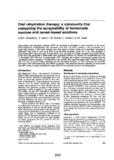| dc.contributor.author | Chowdhury, AMR | |
| dc.contributor.author | Karim, F. | |
| dc.contributor.author | Rohde, J.E. | |
| dc.contributor.author | Ahmed, J. | |
| dc.contributor.author | Abed, F.H. | |
| dc.date.accessioned | 2019-12-18T08:31:45Z | |
| dc.date.available | 2019-12-18T08:31:45Z | |
| dc.date.issued | 1991 | |
| dc.identifier.citation | Chowdhury, A. M., Karim, F., Rohde, J. E., Ahmed, J. & Abed, F. H. (1991). Oral rehydration therapy: a community trial comparing the acceptability of homemade sucrose and cereal-based solutions.. Bulletin of the World Health Organization, 69 (2), 229 - 234. World Health Organization. https://apps.who.int/iris/handle/10665/261296 | en_US |
| dc.identifier.uri | http://hdl.handle.net/10361/13299 | |
| dc.description.abstract | Sugar-based oral rehydration therapy (ORT) for diarrhoea is promoted in many countries of the world. One programme in Bangladesh has instructed more than 13 million mothers in the preparation of a sugar-salt solution in the home; despite very high rates of correct mixing and knowledge, subsequent application was found in only some 20% of all diarrhoea episodes. Since rice is far more available in rural homes (95%) than any type of sugar (30%) and rice gruel is a widely accepted food during illness, a field trial was conducted in three areas (total population, 68,345) to compare the acceptability and use of rice-based ORT with that of sugar-based ORT. Although the mothers unanimously agreed that the rice-based solutions "stopped" the diarrhoea more quickly, they used the sugar-based solutions twice as often (in 40% of severe watery episodes) as the rice-based solutions (in 18%), because the rice-ORT was much more time-consuming and difficult to prepare. The observed reduced utilization of home-made rice-ORT makes it a poor substitute for sugar-ORT at the community level in rural Bangladesh.
PIP:
Sugar-based oral rehydration therapy (ORT) for diarrhea is promoted in many countries in the world. 1 program in Bangladesh has instructed more than 13 million mothers in the preparation of a sugar-salt solution in the home; despite very high rates of correct mixing and knowledge, subsequent application was found in only some 20% of all diarrhea episodes. Since rice is far more available in rural homes (95%) than any type of sugar (30%) and rice gruel is a widely accepted food during illness, a field trial was conducted in 3 areas (total population=68,345) to compare the acceptability and use of rice-based ORT with that of sugar-based ORT. Although the mothers unanimously agreed that the rice-based solutions stopped the diarrhea more quickly, they used the sugar-based solutions twice as often (in 40% of severe watery episodes) as the rice-based solutions (in 18%), because the rice ORT was more time-consuming and difficult to prepare. The observed reduced utilization of homemade rice-ORT makes it a poor substitute for sugar-ORT at the community level in rural Bangladesh. (author's). | en_US |
| dc.language.iso | en | en_US |
| dc.publisher | Bulletin of the World Health Organization | en_US |
| dc.relation.uri | https://apps.who.int/iris/handle/10665/261296 | |
| dc.subject | Oral rehydration solutions | en_US |
| dc.subject.lcsh | Public health. | |
| dc.subject.lcsh | Rural health--Bangladesh. | |
| dc.title | Oral rehydration therapy : a community trial comparing the acceptability of homemade sucrose and cereal-based solutions | en_US |
| dc.type | Article | en_US |

